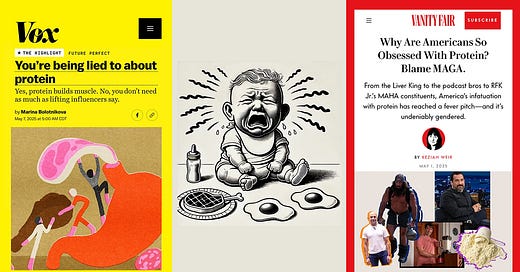Protein isn’t the problem. It’s the solution. But if you’ve read the news lately, you’d think differently.
A recent Vanity Fair article claimed that America’s “obsession” with protein is linked to the MAGA movement. Vox went so far as to say, “You’re being lied to about protein” in their hilarious wannabe hit piece. What they don’t say is why they’re suddenly so concerned about people eating more protein. The answer, like always, is simple: follow the money.
Mainstream media doesn't operate in a vacuum. They rely on advertising dollars from Big Food and Big Pharma—the same companies that thrive when people eat highly processed, low-protein foods and then need medication to manage the chronic diseases that follow.
Moreover, the politicization of protein is evident. Some left-leaning media outlets seem to oppose dietary trends associated with right-wing groups, such as the "Make America Healthy Again" (MAHA) movement, which emphasizes ancestral diets rich in whole foods and animal proteins. So this is another reason for these hit pieces on protein. Health shouldn't be political, but it has become so, with nutritional choices being framed through ideological lenses.
The profit’s in the processing
Here’s the reality: ultra-processed foods (UPFs) make up the bulk of the modern Western diet and are deliberately engineered to be hyperpalatable, shelf-stable, and cheap to produce. They’re loaded with refined carbs and seed oils and provide a shockingly low protein content. One study found that the average protein content of ultra-processed foods is just 9.5% of total energy, less than half that of whole foods.
This isn’t a coincidence. The most aggressively marketed and widely available food products today—breakfast cereals, granola bars, frozen meals, chips, sugary beverages—are all extremely low in protein and deliver the highest profit margins. It’s far more profitable to sell processed sludge made from corn, wheat, soy, and industrial oils than to deal with the cost and logistics of sourcing, storing, and distributing fresh protein-rich whole foods. So of course it’s beneficial to keep the narrative alive that protein isn’t that important. When mainstream outlets repeat slogans like “all foods fit” or “everything in moderation,” they’re reinforcing a message that helps Big Food continue selling high-margin, low-protein junk under the guise of balanced eating.
Protein: the solution
In contrast, high-protein diets—especially those emphasizing whole, animal-based sources like meat, fish, eggs, and dairy—have consistently been shown to aid fat loss, preserve lean mass, and improve metabolic health. Here’s just a sampling of the mountain of evidence:
A 2020 meta-analysis in Advances in Nutrition concluded that higher protein intake significantly improves weight management outcomes, especially in energy-restricted diets.
A 2020 review in the American Journal of Clinical Nutrition found that increased dietary protein (25–30% of total energy) boosts satiety and thermogenesis and helps reduce caloric intake.
A landmark study in Obesity (2005) showed that people on a high-protein diet lost more body fat and preserved more lean mass than those on a standard high-carb diet—even when calories were the same.
Research in The Journal of Nutrition demonstrated that protein-rich breakfasts reduce subsequent food intake and cravings later in the day.
One of the reasons protein works is because it's the most satiating macronutrient. It tells your body, "I'm nourished. I don’t need to keep eating." That’s the opposite of what the food industry wants.
Guess what, everyone: there is no lobby for grass-fed beef. No billion-dollar marketing campaign for sardines, liver, or pastured eggs. But there is a massive, coordinated industry built around keeping you eating processed trash that’s easy to produce, cheap to ship, and addictive by design. That’s where the profit is.
I learned the hard way with my company Nose to Tail that there isn’t much money to be made selling quality meat. There’s just no profit margin on it. It will never make corporations millions of dollars, and they have no incentive to promote or endorse these foods straight from nature. The same goes for lettuce or blueberries. Nobody is making mega cash from these foods. I’ll repeat my favorite quote, “The profit’s in the processing.”
The Sickcare System steps in
When you eat those processed foods long enough, you get sick—so Big Pharma steps in with the other half of the business model. They’ll sell you the solution to the problem their partners in the food industry created. From insulin to statins to GLP-1 injections, there’s endless money to be made when your food doesn’t nourish you.
That’s why high-protein, nutrient-dense whole foods—especially animal products—are demonized. Not because they’re bad for you, but because they work. They help people lose fat, reverse disease, and stop needing a lifetime of prescriptions. They cut into someone’s bottom line.
Don’t fall for it.
If the media is smearing protein, it’s because you’re getting too close to the truth.
-Brian Sanders
p.s. if you enjoyed this article, check out my Food Lies docuseries intro and get updates on when it will be released on my @food.lies Instagram
p.p.s. please consider supporting my writing/research by becoming a paid subscriber :)




